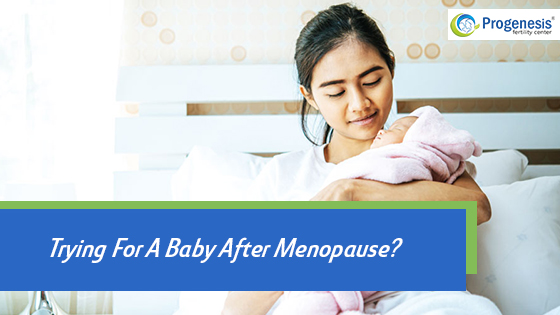
blog address: https://progenesisivf.com/pregnancy-after-menopause/
blog details: What is Menopause?
Menopause is a natural biological process that marks the end of a woman's reproductive period. It occurs when a woman's ovaries stop producing eggs, resulting in the cessation of menstrual cycles. Menopause typically occurs between the ages of 45 and 55, with an average age of onset of around 51.
During the menopausal transition, women may experience a range of symptoms, including hot flashes, night sweats, mood changes, vaginal dryness, and changes in libido. These symptoms are caused by changes in hormone levels, particularly a decrease in estrogen and progesterone.
Menopause is a normal and natural part of aging and does not require medical treatment. However, some women may seek treatment for menopausal symptoms that are interfering with their daily life. Hormone therapy, lifestyle changes, and alternative therapies are all options for managing menopausal symptoms.
Symptoms of menopause:
Irregular periods: Menstrual cycles may become irregular, shorter, or longer before they stop altogether.
Hot flashes: A sudden feeling of warmth spreading through the upper body and face, often accompanied by sweating and rapid heartbeat.
Night sweats: Hot flashes that occur during the night, leading to excessive sweating.
Vaginal dryness: A decrease in estrogen levels can cause vaginal dryness, itching, and discomfort during sex.
Mood changes: Mood swings, irritability, depression, anxiety, and fatigue are common symptoms of menopause.
Sleep problems: Insomnia or trouble sleeping due to hot flashes, night sweats, or other menopausal symptoms.
Weight gain: Changes in hormones can lead to weight gain, especially around the midsection.
Urinary problems: Increased frequency of urination or urinary incontinence.
It's important to note that not all women experience all of these symptoms, and some may have only mild symptoms while others may experience severe ones. If menopausal symptoms are affecting your daily life, it's important to talk to your healthcare provider about available treatment options.
Causes of Menopause:
Menopause is caused by a natural decline in the production of reproductive hormones, primarily estrogen, and progesterone. As women age, their ovaries produce fewer and fewer of these hormones, eventually leading to the end of menstrual periods and fertility.
The exact cause of this decline in hormone production is not fully understood, but it is believed to be related to changes in the functioning of the hypothalamus and pituitary gland in the brain, which regulate the production of hormones in the ovaries.
Other factors that may contribute to the earlier onset of menopause or premature ovarian failure include:
Genetics: A family history of early menopause or premature ovarian failure may increase a woman's risk of experiencing these conditions.
Autoimmune disorders: Certain autoimmune disorders, such as thyroid disease or rheumatoid arthritis, may increase the risk of premature ovarian failure.
Cancer treatments: Radiation or chemotherapy treatments for cancer may damage the ovaries and lead to early menopause.
Surgery: Removal of both ovaries or the uterus and ovaries can cause menopause to occur suddenly, regardless of a woman's age.
Lifestyle factors: Smoking, excessive alcohol consumption, and being underweight or overweight may increase the risk of early menopause.
It's important to note that menopause is a natural and inevitable part of aging for women and is not considered a disease or disorder.
Possibility of pregnancy after menopause
Once a woman has gone through menopause, pregnancy is no longer possible naturally because the ovaries have stopped releasing eggs. Menopause is defined as the absence of menstrual periods for 12 consecutive months, which indicates that the ovaries are no longer producing eggs.
However, it's important to note that during the perimenopausal transition, women may still ovulate occasionally, making it possible to become pregnant.
If a woman is experiencing symptoms of menopause and has not had a menstrual period for over a year, but becomes pregnant, this is known as a rare event called "menopausal pregnancy." Menopausal pregnancies can be high-risk and have a greater chance of complications, so it's important for women who suspect they may be pregnant after menopause to seek prompt medical attention.
keywords: pregnancy after menopause, pregnant after menopause, get pregnant after menopause, signs of pregnancy after menopause
member since: Mar 01, 2023 | Viewed: 376